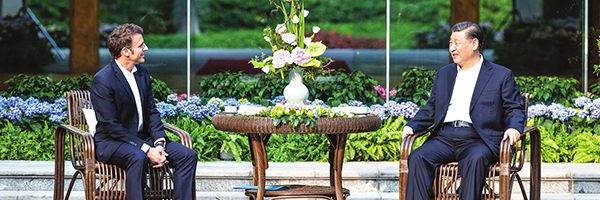US’ uneasiness over Macron’s ‘strategic autonomy’ statement shows Washington’s declining ability to maintain hegemony

Global Times, April 10, 2023 —
French President Emmanuel Macron’s remarks urging Europe to reduce its reliance on the US and to be cautious about being dragged into a conflict between Beijing and Washington over Taiwan question are being seen by observers as jamming the brakes on Europe that is being coerced into becoming deeply involved in the Taiwan question, and signals a dead end for the US strategy of luring Europe to contain China.
This rational and pragmatic warning appeared to alarm American politicians and media, who immediately criticized the French President. This discomfort mirrored Washington’s declining ability to rein in its allies and growing anxiety in maintaining hegemony.
Speaking with media outlet Politico and two French journalists in an interview on his plane back after concluding his visit to China, Macron emphasized that “the great risk” Europe faces is that it “gets caught up in crises that are not ours, which prevents it from building its strategic autonomy,” according to Politico.
“The paradox would be that, overcome with panic, we believe we are just America’s followers,” Macron said in the interview. “The question Europeans need to answer … is it in our interest to accelerate [a crisis] on Taiwan? No.”
He also noted that Europe had increased its dependency on the US for weapons and energy and must now focus on boosting European defense industries.
In response to Macron’s latest take on Taiwan, Wang Wenbin, spokesperson of China’s Ministry of Foreign Affairs, said at a Monday briefing that China hopes all parties can recognize the essence of the Taiwan question, continue to stick to the one-China principle and oppose any form of Taiwan secessionist activities. The biggest threat to cross-Straits peace are Taiwan secessionist activities and US collusion with them, said the spokesperson .
Macron’s call for Europe to not to be caught in a conflict on the Taiwan question came as the Chinese People’s Liberation Army (PLA) conducted drills around Taiwan island after Tsai returned to the island following her meeting with US House Speaker Kevin McCarthy in California.
The French President’s rational plea for Europe jams the brakes on some Eastern European nations and European Parliament, lured by the US, in their attempt to lead the continent astray and get more involved in the Taiwan question, Sun Keqin, a research fellow at the China Institutes of Contemporary International Relations, told the Global Times. Macron is warning Europe not to go so far on this issue and risk damaging Europe’s own interests, said Sun.
Sun noted that Macron’s stressing the need for Europe’s strategic autonomy was a result of a sober awakening from the US’ selfish policies on Europe, especially since the Russia-Ukraine crisis, and also from being emboldened by his “very successful” visit to China, during which he saw China’s good will toward France and the huge potential of cooperation with China, said Sun.
Some in the US were alarmed by Macron’s message. Republican senator and notorious China hawk Marco Rubio urged European countries to clarify “pretty quickly” if Macron spoke for Europe or France alone.
A harsh editorial titled “Macron Blunders on Taiwan—and Ukraine” published by Wall Street Journal on Sunday said “He [Macron] weakens deterrence against Chinese aggression and undermines US support for Europe.”
After US President Joe Biden took office, he made fixing ties with Europe one of his priorities, then after a slew of turbulent events such as the Ukraine crisis and energy supply disruption, the US firmly believed that Europe was willing to be marshaled under its umbrella, Lü Xiang, research fellow at the Chinese Academy of Social Sciences, told the Global Times, adding, “However, Macron’s statement suggests otherwise.”
“Macron’s statement signals the US strategy of luring Europe to contain China is coming to a dead end,” according to Lü.
Echoing Lü, Cui Hongjian, director of the Department of European Studies at the China Institute of International Studies, said that the US politicians’ and media’s discomfort reflected the US’ rising anxiety over its hegemony, as well as its declining ability to rein in its allies.
In a piece published by the New York Times, the US newspaper said Macron was playing “the Gaullist card,” a reference to former French president Charles de Gaulle’s assertion of independence from the US once World War II was won.
“Some US media tend to use the term ‘Gaullist’ to criticize Macron. But in my view, Gaullism helped France break the antagonism during the Cold War, and won space for East and West; France and China,” Cui told the Global Times.
“France has made the right choice before. Given a second chance, it is still possible to make the right choice,” Said Cui.
